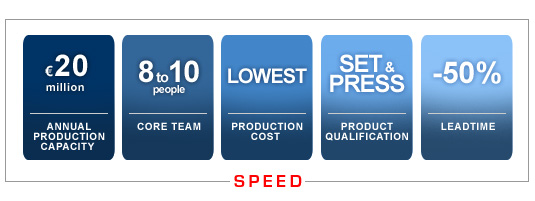SPEED: The Toolmaking Grail
Like other companies on the planet, we have long asked ourselves if there could be a Holy Grail of the diemaking religion, the technological cup that could allow us not just to ensure the continuing restoration, flourishing and immortality of company know-how but also to compress to an inconceivable level the costs of indeterminateness, inefficiency and inefficacy of key processes, which variously afflict even diemakers of great excellence, to be able to tackle with hopes of success any aided and monotonous predatory pricing and thus reaffirm, with renewed vigour, our presence in the market.
And so, without hesitation, we stripped ourselves of any prejudice and began long scientific peregrinations in search of our Grail.
This was how SPEED was conceived.
What is SPEED?
The SPEED (Self-driven Production Expert Environment for Dies) project is the magnum opus and the pride of FRIGERI.
FRIGERI’s R&D has been working on it since October 2008, after 4 years of research and preparation. SPEED aims to create an entire, hardware and software integrated production system that is intelligent and self-moving, able to design, manufacture and assemble dies for sheet metal in a markedly de-skilled environment with little or no need for expert human intervention.
Briefly, SPEED consists of four subsystems:

Both the D-DESIGN sw module (with 2 submodules, for automatic handling of stamping layout planning and die design) and the D-MANUFACTURING sw module, that automatically handles milling, turning, drilling, EDMW and grinding) are based on a specially created proprietary AI code, AFR technologies and hybrid inferential routines.
The PRODIECTION hw module consists of an automatic, selective, modular and flexible production line in which are integrated handling, manipulating and adjustment devices for materials, semi-finished and finished products and measuring stations with a two-way interface.
The ADA (Automatic Die Assembly) hw module consists of a plant for the assembling and automatic coupling of dies and for any reworking of parts that do not conform.
The most important thing about SPEED, which the FRIGERI management wanted as the basis of the entire project, is that the core knowledge of such a complex process as the design and manufacturing of stamping dies does not depend on people, but is contained in and implemented by the D-DESIGN and D-MANUFACTURING sw modules. These are intellixpert agents: intelligent because they can autonomously manage specific process with human style problem-solving capacities and expert because they contain expert knowledge.
Thus, thanks to SPEED, operational know-how does not belong to those who apply it but, like the factory and its production machinery, belongs to the company and remains under the company’s full and unconditional control.
SPEED attack
1) SPEED is a entire production environment, not a single product or process. It can be infinitely grown and expanded, and is thus a TOTAL competitive weapon.
2) SPEED was conceived to contain all the specific predictive, productive and operational knowledge available. Methods of inputting new knowledge, necessary to continuously regenerating the subsystems and maintaining their vitality, will be integrated into the same environment.
3) SPEED is designed to implement the core knowledge it contains (Die Design&Manufacturing) AUTONOMOUSLY and WITHOUT HUMAN INTERVENTION, a method quite different from that of traditional toolmakers. Supporting know-how, currently managed in part by human intervention, will be progressively transferred to and operated directly by SPEED.
4) SPEED will allow progressive and complete transfer of knowledge and fundamental competences from men to intelligent systems, thus guaranteeing the immortality and inaccessibility of company know-how in the very long term.
5) SPEED is a production environment that cannot be imitated. Competitors, particularly those that prey on others, may be able, with great effort and great approximation, to imitate and copy the products of SPEED but they will not be able to replicate the entire environment that is always in motion and self-moving. The competitive advantage is thus destined to become permanent and unbeatable.
SPEED in numbers

1) ANNUAL PRODUCTION CAPACITY: estimated at at least €20 million when fully operational, with the possibility of expansion by adding new production lines.
2) PERSONNEL: as currently configured, SPEED needs a core team of 8 to 10 people.
3) PRODUCTION COST: a set of dies produced by SPEED when fully operational will cost less than the same set produced by the cheapest diemaker on earth.
4) PRODUCT QUALIFICATION: in the toolmaking sector, dies are considered prototypes needing extenuating, long (even 3-4 weeks) and costly testing on Customer presses before mass production can be safely and efficiently started. SPEED, which operates using the entire available knowledge base and has decision-making capacity and multiple operativity, will allow the first SET&PRESS dies to be produced. Delivery of dies and production startup will become synonymous for SPEED products.
5) LEADTIME: in the startup phase alone, SPEED will halve the lead times for homogeneous die production: the current 3 months for delivery will, with SPEED, become 1.5 months from Customer order, with the advantages in points 3) and 4).



 Product Catalogue
Product Catalogue